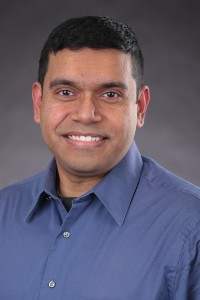Faculty
Professors

Anirban Chakraborty, Ph.D.
Assistant Professor
Geomicrobiology, ecophysiology of extremophiles, subsurface microbiome
Office: Life Sciences 416
Lab - Life Sciences 417
Research
We aim to understand fundamental ecological processes that consist of interactions of microbial life with the lithosphere and the hydrosphere at physiological, organism and community levels. To do this, we employ field- and laboratory-based approaches and frequently integrate molecular diversity surveillance and meta-omics tools with traditional microbiological and geochemical techniques.
Primary research areas include 1) microbial dispersal and its impact on biomass circulation and community assembly in the deep marine biosphere using dormant thermophilic bacteria as model organisms, 2) activity of anaerobic thermophiles associated with biogeochemical cycling of elements in the continental subsurface, and 3) microbial metabolic diversity in contaminated groundwater and soil in relation to developing efficient pollutant cleanup strategies. These highly interdisciplinary and collaborative themes will lead to a better understanding of the ecological forces that drive the assembly of natural microbial communities and address complex challenges in agriculture, environment and energy sectors.
Teaching
BIOL 4433/5533 - Microbial Physiology
Biographical sketch
Dr. Chakraborty is an environmental microbiologist who often works at the crossroads of geology and biology. Dr. Chakraborty's doctoral research at Indiana University Bloomington focused on the redox geochemistry of microbial iron oxidation coupled to nitrate reduction by freshwater bacteria. During a one-year postdoctoral fellowship in West Bengal, India, Dr. Chakraborty investigated microbial communities in arsenic-contaminated shallow aquifers. Prior to joining Idaho State University in December of 2021, Dr. Chakraborty was a postdoctoral research associate at the University of Calgary where he discovered that viable endospores of thermophilic bacteria are transported from deep petroleum reservoirs to seafloor sediments of the Gulf of Mexico by natural hydrocarbon seepage. Dr. Chakraborty has participated in several research expeditions in the remote Canadian Arctic, the North Atlantic and the Pacific Ocean.
Education
2006, M.Sc. Environment Management, Forest Research Institute (Deemed University), Dehra Dun, India
2004, B.Sc. Zoology (Hons.), University of Calcutta, Kolkata, India
Selected publications
Chakraborty, A., M. Suchy, C.R.J. Hubert and M.C. Ryan. 2022. Vertical stratification of microbial communities and isotope geochemistry tie groundwater denitrification to sampling location within a nitrate-contaminated aquifer. Science of The Total Environment 820:153092.
Dong, X., J.E. Rattray, D.C. Campbell, J. Webb, A. Chakraborty, O. Adebayo, S. Matthews, C. Li, M. Fowler, N.M. Morrison, A. MacDonald, R.A. Groves, I.A. Lewis, S.H. Wang, D. Mayumi, C. Greening and C.R.J. Hubert. 2020. Thermogenic hydrocarbon biodegradation by diverse depth-stratified microbial populations at a Scotian Basin cold seep. Nature Communications 11:5825.
Chakraborty, A., S.E. Ruff, X. Dong, C. Li, E.D. Ellefson, J.M. Brooks, J. McBee, B.B. Bernard and C.R.J. Hubert. 2020. Hydrocarbon seepage in the deep seabed links subsurface and seafloor biospheres. Proceedings of the National Academy of Sciences USA 117:11029-11037.
Dong, X., C. Greening, J.E. Rattray, A. Chakraborty, M. Chuvochina, D. Mayumi, J. Dolfing, C. Li, J.M. Brooks, B.B. Bernard, R.A. Groves, I.A. Lewis and C.R.J. Hubert. 2019. Metabolic potential of uncultured bacteria and archaea associated with petroleum seepage in deep-sea sediments. Nature Communications 10:1816.
Chakraborty, A., E.D. Ellefson, C. Li, D. Gittins, J.M. Brooks, B.B. Bernard and C.R.J. Hubert. 2018. Thermophilic endospores associated with migrated thermogenic hydrocarbons in deep Gulf of Mexico marine sediments. The ISME Journal 12:1895-1906.
Chakraborty, A., E.E. Roden, J. Schieber and F. Picardal. 2011. Enhanced growth of Acidovorax sp. strain 2AN during nitrate-dependent, Fe(II) oxidation in batch and continuous-flow systems. Applied and Environmental Microbiology 77:8548-8556.

